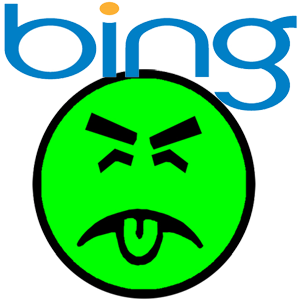 NEWS
NEWS
 NEWS
NEWS
 NEWS
NEWS
![]() If you are searching for images on Bing, beware: this search engine has turned out to be a poisonous one! Yes, Bing is spreading search engine poisoning, and driving web traffic to payday loan sites. A recent study by SophosLabs informed that the 65 per cent of the poisoned search results blocked by Sophos appliances over the last two weeks were originated from Bing, while 30 per cent came via Google. Only 5 per cent poisoned results came out from other search engines. Among all these, 92 per cent results were related to the image related searches, while rest 8 per cent were text searches.
If you are searching for images on Bing, beware: this search engine has turned out to be a poisonous one! Yes, Bing is spreading search engine poisoning, and driving web traffic to payday loan sites. A recent study by SophosLabs informed that the 65 per cent of the poisoned search results blocked by Sophos appliances over the last two weeks were originated from Bing, while 30 per cent came via Google. Only 5 per cent poisoned results came out from other search engines. Among all these, 92 per cent results were related to the image related searches, while rest 8 per cent were text searches.
“Search engine poisoning can be very dangerous for internet users, as they trust the search engine they’re using to filter out malicious links, and in this case it seems to be Bing which is letting internet users down,” said Fraser Howard, principal virus researcher, Sophos. “All search engines will miss attempts to poison their search results however, and with very few give-away clues to spot infected image searches for example, the users themselves may also struggle to detect and avoid infected search results.”
The worst part is that it is really hard for normal users to recognize rogue images within image search results. As they are not able to differentiate between genuine and poisoned results, this makes users click on malicious results and lead them to results in being redirected to a malicious Blackhole exploit site. Though there is actually no tool with search engines to identify poisoned results, all you can do is to be aware and try to identify the good from the bad ones.
Support our mission to keep content open and free by engaging with theCUBE community. Join theCUBE’s Alumni Trust Network, where technology leaders connect, share intelligence and create opportunities.
Founded by tech visionaries John Furrier and Dave Vellante, SiliconANGLE Media has built a dynamic ecosystem of industry-leading digital media brands that reach 15+ million elite tech professionals. Our new proprietary theCUBE AI Video Cloud is breaking ground in audience interaction, leveraging theCUBEai.com neural network to help technology companies make data-driven decisions and stay at the forefront of industry conversations.